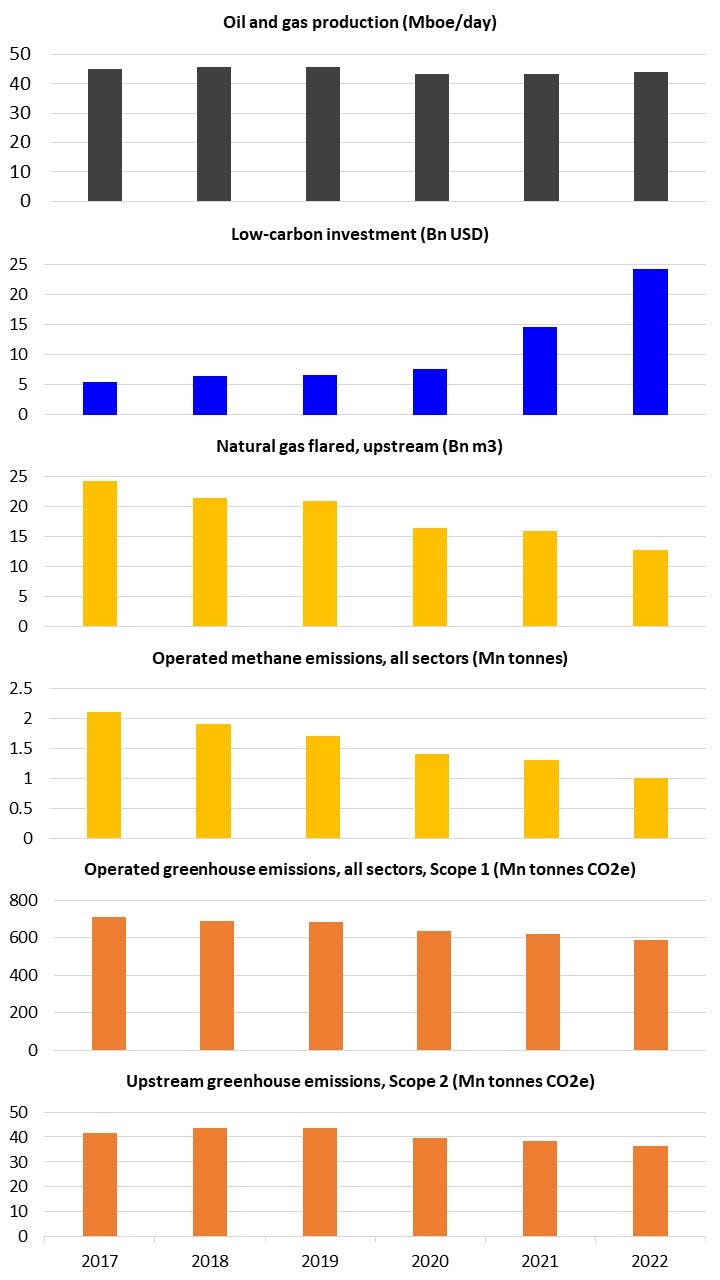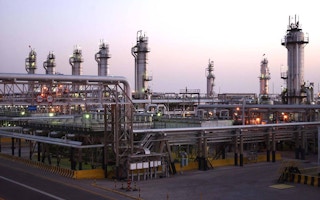An alliance of oil and gas majors reported spending US$24.3 billion on low-carbon technologies such as renewables and carbon capture in 2022 – two-thirds higher than the year before, but overall a small fraction of their earnings.
To continue reading, subscribe to Eco‑Business.
There's something for everyone. We offer a range of subscription plans.
- Access our stories and receive our Insights Weekly newsletter with the free EB Member plan.
- Unlock unlimited access to our content and archive with EB Circle.
- Publish your content with EB Premium.
Meanwhile, their methane emissions continued falling, to 1 million tonnes last year – half of what was released five years ago.
The Oil and Gas Climate Initiative (OGCI) said its latest figures, released last week, will inspire the fossil fuel industry and help build a strong foundation for a net-zero future.
The initiative, formed in 2014, counts 12 members – Aramco, bp, Chevron, China National Petroleum Corporation, Eni, Equinor, ExxonMobil, Occidental, Petrobras, Repsol, Shell and TotalEnergies – that produce over a quarter of the world’s oil and natural gas.
Fossil fuel firms are under increasing scrutiny in the lead up to the global COP28 summit, where governments will negotiate on policies to fight global warming and protect people from climate risks.
“We can see that we have made some good progress, showing that working together can achieve results in decarbonising our industry. But we recognise that there’s more to do,” said Bjorn Sverdrup, OGCI’s executive committee chair.

OGCI members cut greenhouse emissions and increased green spending in 2022. Data: OGCI. [Click to enlarge.]
The US$24.3 billion green spend represents only about 5 per cent of the US$476 billion net income OGCI members earned in 2022 amid high fuel prices. Renewable energy accounted for over half of the low-carbon investments made last year.
There is however an increase in funds allocated for research into low-carbon technologies such as hydrogen and biofuels: the US$1.8 billion spent on these studies last year made up 32 per cent of the firms’ total research spending, up from under 20 per cent in past years.
OGCI said funding tripled on-year for carbon capture, utilisation and storage, a cluster of technologies aimed at filtering out carbon emissions from burning fossil fuels. The 40 large-scale projects that members are involved in could remove up to 300 million tonnes of carbon dioxide a year by 2030, the coalition said.
Meanwhile, OGCI members reported continued improvements in reining in methane – a powerful greenhouse gas and the primary component of natural gas – with emissions falling to 1 million tonnes in 2022, from 1.3 million tonnes in 2021, and over 2 million tonnes in 2017.
Upstream flaring of natural gas – a major source of methane emissions – dropped to under 13,000 million cubic metres, from almost 16,000 million cubic metres in 2021 and over 24,000 million cubic metres in 2017.
Stemming methane emissions is one of the few areas where the oil and gas firms have managed to strike a partnership with environmental advocates, and a key example cited by the industry in arguing they play a legitimate role in climate mitigation efforts.
The gas is over 80 times more potent at heating the earth than carbon dioxide in the first few years after it is released into the atmosphere.
OGCI said it is expanding a satellite monitoring campaign for methane emissions to more countries, after conducting scans over Iraq, Kazakhstan, Algeria and Egypt. The coalition is also aiming for near-zero methane emissions by 2030.
Overall, OGCI members slashed their own greenhouse gas emissions by 5 per cent on-year to 590 million tonnes of carbon dioxide.
Upstream “Scope 2” emissions from energy used also dropped 5 per cent to 36.4 million tonnes of CO2.
OGCI did not report downstream Scope 2 emissions, such as from refineries, nor “Scope 3” emissions, from customers burning purchased fossil fuels. Scope 3 emissions can account for up to 95 per cent of oil and gas companies’ total output.
Oil and gas production in 2022 remained stable at 43.9 million barrels of oil-equivalent a day, up from 43.5 million barrels in 2021 but lower than the 45.8 million barrels in 2019, before the Covid-19 pandemic.
Scientists have called for a rapid scaling down of fossil fuels as global warming creeps towards 1.5 degrees Celsius above pre-industrial levels, beyond which climate risks such as droughts and floods are expected to become unbearable.
Lea Guerrero, Philippines country director at Greenpeace Southeast Asia, said OGCI’s figures reflect “business as usual”.
“There is nothing significant about it except to prove the fossil fuel industry’s immoral behavior of profiting from destruction while communities around the world suffer from the climate crisis,” Guerrero said, noting the firms’ high earnings and the small 5 per cent cut in operational emissions.
Carbon capture is unproven and costly, and would deflect attention from the need for a fast and just transition, she added.
Several members of OGCI also have plans to open more oil and gas production sites. TotalEnergies could spend nearly US$32 billion on new developments by 2030, analaysis by non-profit Global Witness found last year. Shell would expend over US$28 billion, PetroChina over US$26 billion, and ExxonMobil nearly US$24 billion.
“These carbon majors keep the public hooked to ever-increasing consumption while at the same time spending millions of dollars in greenwashing to portray themselves as sustainable,” Guerrero said, noting that global damage attributable to climate change last year reached US$360 billion.
“These polluters must be made to pay for economic and non-economic losses and damages brought on by climate impacts,” Guerrero added.
Oil and gas firms are expected to join COP28 next month, after hosts United Arab Emirates said all stakeholders must be involved. The firms were also present at last year’s COP27 in Egypt, though largely absent from Scotland’s COP26 in 2021.
World governments pledged in 2021 to phase down the use of coal, the most pollutive fossil fuel. But there has been firm resistance to changing the wording to a more ambitious “phase out”, or for more types of fossil fuels to be covered under such terms.
Earlier this year, COP28’s president-designate Dr Sultan Al Jaber, who is also chief of the United Arab Emirates’ national oil firm, said he envisions a phase-out of oil and gas emissions – suggesting that fossil fuel use can be decoupled from its greenhouse gas output.










